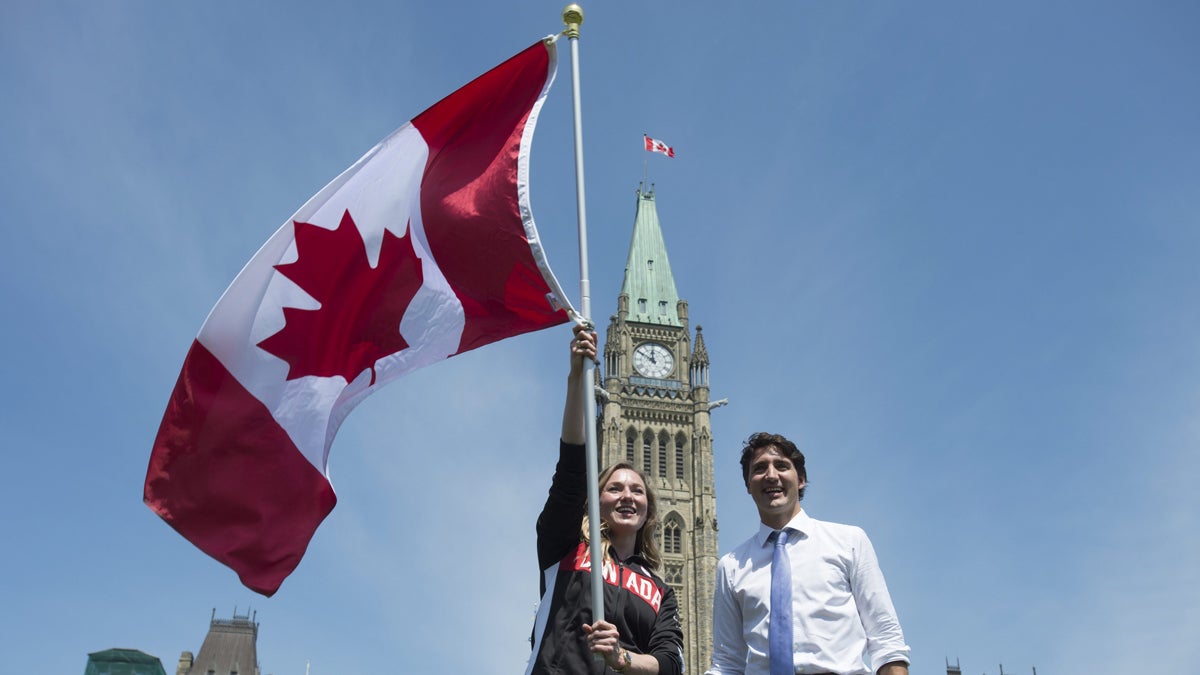You said you want to move to Canada? Go soon while it’s still hot.
Scurrilous allegations of Canada's blandness and Canadians' tentativeness abound, but Canada abounds in color and character and civility.

Canadian Prime Minister Justin Trudeau looks on as athlete Rosie MacLennan waves the Maple Leaf in Ottawa after being named as the flag bearer for the 2016 Summer Olympics. (Adrian Wyld/The Canadian Press via AP
Q: Why did the Canadian cross the road?
A: To get to the middle.
Scurrilous allegations of Canada’s blandness and Canadians’ tentativeness abound; but, having lived for a decade or so in Ottawa, reputedly the world’s second-coldest capital city after Ulaanbaatar in Mongolia, I beg to differ: Canada abounds in color and character and civility.
Maybe that’s why many Americans said they’d emigrate to Canada if Trump won the presidency. But their awareness of the huge land to their north is often minimal at best.
Ask an American to name Canada’s prime minister, or the number of provinces, and you’re likely to draw a blank.
They might be surprised to know that Canada is a good deal younger than its neighbor to the south. The American president-elect, Donald Trump, at age 70, is old enough to be the father of Justin Trudeau, Canada’s boyish 44-year-old prime minister. And Canada itself came into being almost a century after the United States. In fact, it has had its distinctive maple-leaf flag only since Feb. 15, 1965, now celebrated as National Flag Day, supplanting as it did the vestigial signs of the British Empire, including the Union Jack.
The country’s head of state, though, is still the reigning monarch of England, Elizabeth II, along with a Canadian governor general; and Canada Day is July 1. The current and 28th governor general is David Johnston, 75, a ranking academic who has held appointments at both Harvard and Cambridge universities. The last Briton appointed to the role was Lord Tweedsmuir, otherwise known as the author John Buchan, who wrote such thrillers as “The 39 Steps” (upon which Alfred Hitchcock based a movie). The incumbent is housed at the impressive Rideau Hall in Ottawa.
While the U.S. motto calls for “life, liberty, and the pursuit of happiness,” Canada’s is for “peace, order, and good government.” Sounds pretty pedestrian, right? Like when an American bumps into a Canadian on the sidewalk, and the Canadian says “sorry.”
I once asked an American newspaper editor why the U.S. media seldom if ever carries stories about Canada. His laconic response was that, as soon as something happened in Canada, they’d report it.
Well, that time has come. The Economist noted in a recent cover article titled “Liberty moves north: Canada’s example to the world” that, compared with the U.S., Canada’s safety net is wider and its gun control laws are saner. In fact, it’s been said that a Canadian is an unarmed American with free healthcare. Surprisingly, one-fifth of Canada’s population is foreign-born, nearly twice the proportion in the United States.
True, Canada lacks America’s rugged individualism and doesn’t have a tradition of innovation — nothing to compare with the invention of a Google or a Facebook, for example. But it does have an abundance of natural resources, which can be shipped over the border — a border that requires no wall to keep people in or out. That said, Canada admits more than 300,000 immigrants a year (operating on a points system that allows it to admit only those applicants it wants), including lately some 33,000 Syrian refugees. And Mexicans soon will not require a Canadian visa.
According to the OECD, life expectancy in Canada is greater than in Japan, Italy, France, or Britain; and it beats all those countries and the U.S. on life satisfaction scores. Mr. Trudeau, whose country is not burdened with multibillion-dollar expenditures on wars, or on a horrific toll of slaughter by citizens’ gunfire, has guaranteed to focus the country’s resources on building up its infrastructure. So it may very well be that in the not-too-distant future you will be able to take a high-speed train the 3,000 miles from Halifax, Nova Scotia, to Vancouver, British Columbia.
But if you do decide to emigrate, remember that Canada is not simply a northern version of the U.S. In a way, with its emphasis on social security and cradle-to-grave health care coverage, it’s more like Scandinavia. Also, keep in mind that is not a good idea to take skis or snowshoes with you when you cross the border in midsummer. And try to speak a few words of French if you venture into Québec, where, for the majority of the population, it’s the chief language.
Oh, and develop an enthusiasm for the national religion — hockey.
—
David Woods, Ph.D., is a Philadelphia-based medical writer and editor. A former editor in chief of the Canadian Medical Association Journal, he is the author of four books and more than 200 articles, editorials, and reviews in peer-reviewed health care publications.
WHYY is your source for fact-based, in-depth journalism and information. As a nonprofit organization, we rely on financial support from readers like you. Please give today.


